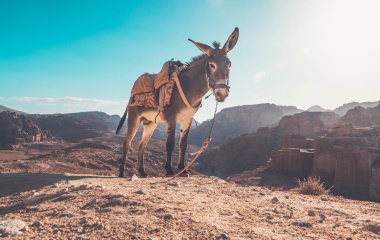
Until modern times, travel was viewed as something best avoided. It was slow, uncomfortable, and often quite dangerous. Our rabbis even instituted a special prayer (Brachot 29b-30a) to be said when one has to travel.
Spiritually, travel represented rootlessness, detachment from our natural environment. The person guilty of manslaughter had to flee to a city of refuge; and if he accidentally killed someone while he was already in such a city, he was required to move to another one. The notion of galut, exile, is related to our distance from what is meant to be our natural abode. The punishment of the Jewish people in the desert was to wander from place to place.
Today, travel is viewed as fun, a reward for hard work, and something for which we save up money. The more exotic the travel destination, the greater the anticipation. And, not surprisingly, it is very difficult today to feel that exile is a punishment; moving around is just a natural process to us today.
The Torah portrays baderech, “on the way”, as something dangerous, from which we need protection. Yaakov, as he flees from Eisav, prays for G-d to “guard him baderech” (Breisheet 28:20); Yaakov refused to send Binyamin to Egypt, lest “a tragedy happen baderech” (Breisheet 42:38); Yosef, after revealing his identity, tells his brothers, “Do not get angry baderech”(Breisheet 45:24) on his deathbed; Yaakov tells Yosef that “Rachel died unto me baderech,” (Breisheet 48:7). It was “baderech, on the way, in the lodging” (Shemot 4:24), that G-d was about to kill Moshe for failing to perform brit milah; Moshe tells Yitro of “all the travails that had befallen them baderech” (Breisheet 18:8).
It is in Parshat Ki-Teze, which translates as “when you go out”, that the word baderech appears most often. The Torah forbids the acceptance of converts from the nations of Amon and Moav, as “they did not greet you with bread and water baderech, when you left Egypt” (Devarim 23:5); we are obliged to remember “what the Lord, our G-d, did to Miriam [for speaking negatively against her brother] baderech, when you left Egypt” (Devarim 24:9). We find the term used twice in succession as the Torah warns that we must destroy Amalek, the embodiment of evil. “Remember what Amalek did to you baderech, when you left Egypt, how he happened to you baderech” (Devarim 25:17-18).
Yet G-d “creates the cure before the disease”. While baderech, or travelling on the way, can be dangerous, it can also provide opportunities for good. “Do not see the donkey of your brother or his ox falling baderech...you shall stand them up with him” (Devarim 22:4). The mitzvah of aiding one in need—even if it’s only the needs of his animal—is followed by that of shiluach hakan, the great mitzvah to send away the mother bird before you can take the young. It is one of the very few mitzvot for which we are promised a long life. And how does the Torah describe the scenario for this mitzvah? “When you come across a bird’s nest baderech”.
When one travels, one is usually focused on getting to a destination. Yet we must be cognizant of the need to pause and help others during our travels, even if that may mean arriving a little late.
It is the Shema that is the identifying mark of the Jew, and many Jews went to their deaths with these words on their lips. That first paragraph, focusing on the acceptance of the yoke of heaven, teaches that, “You shall teach them to your children, and speak of them when you sit in your home and when you travel baderech, when you go to bed and when you awake”. And the second paragraph of the Shema, focusing on the acceptance of the yoke of commandments, reemphasizes to “teach your children to speak of them when you sit in your home and when you travel baderech, when you go to bed and when you awake”.
We are to “accept the yoke of heaven” and the “yoke of commandments” on whatever derech we may find ourselves. May we be able to do so, that we can be blessed with the concluding words: “that you and your children may live long in the land that the Lord swore to your ancestors to give them for as long as the heavens are above the earth”.



